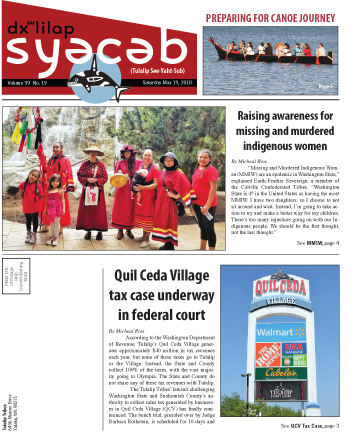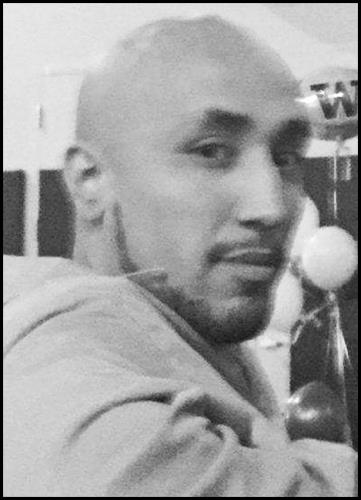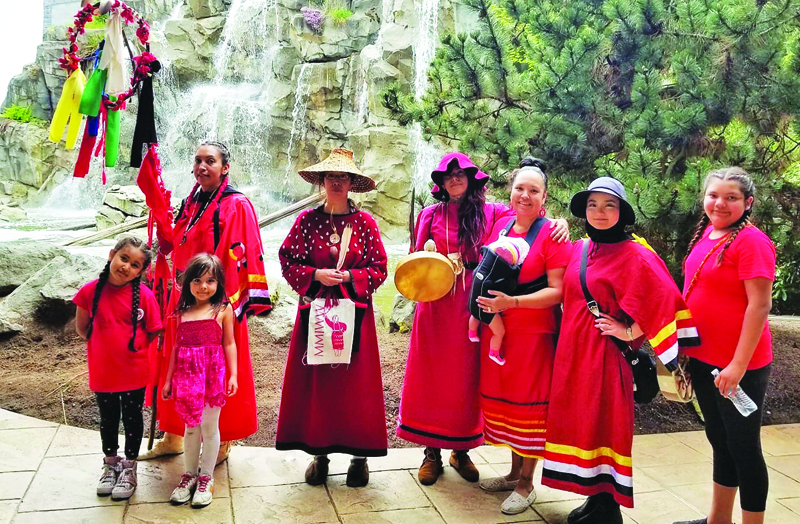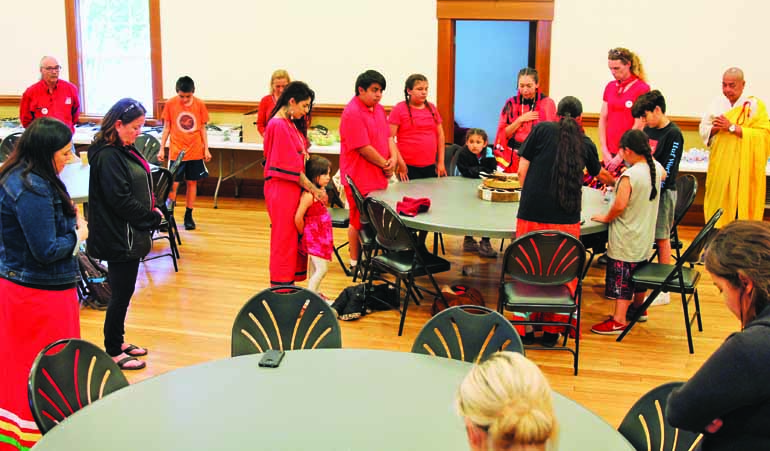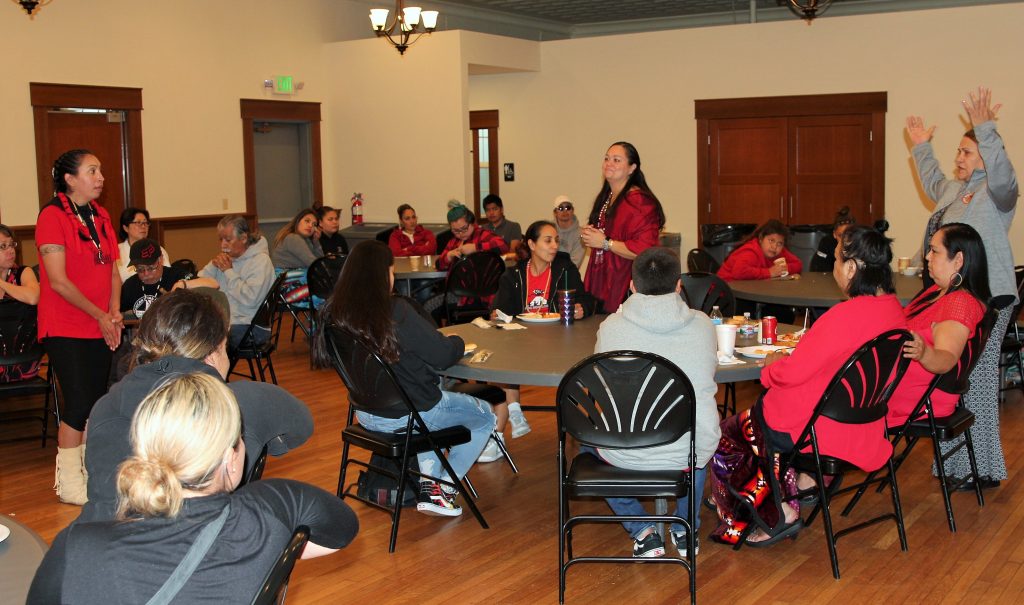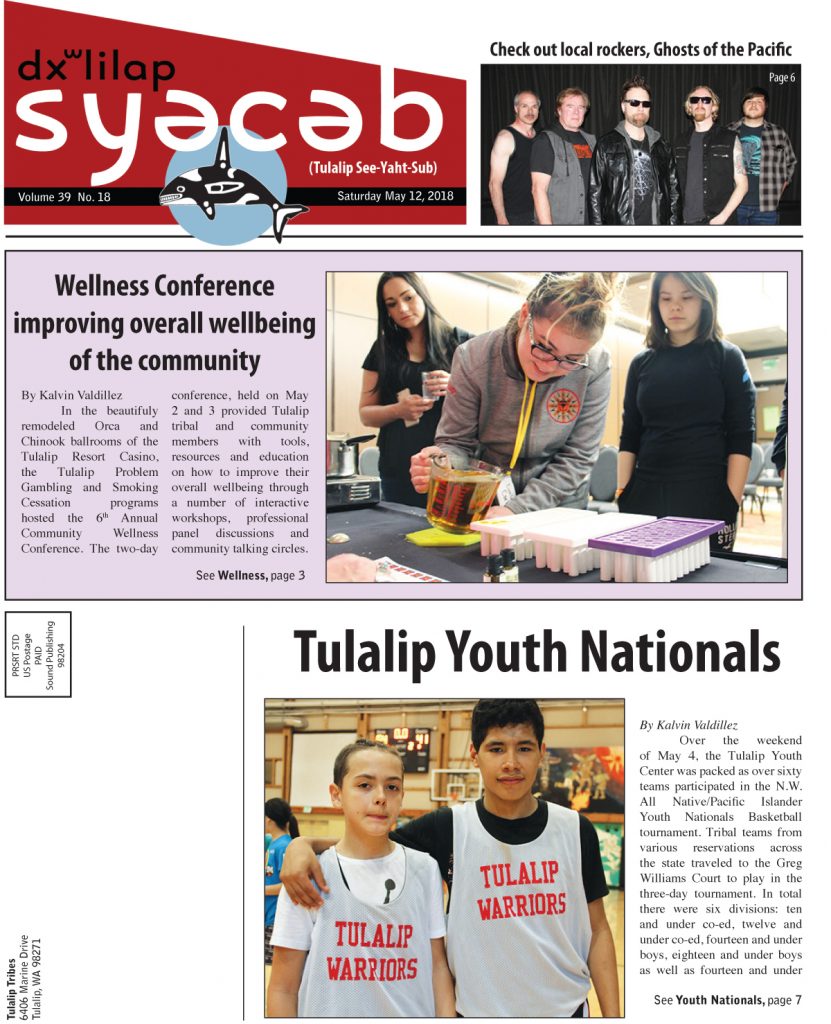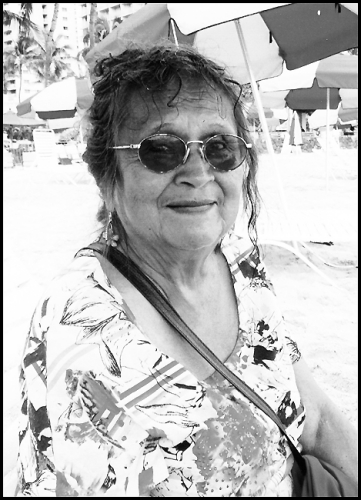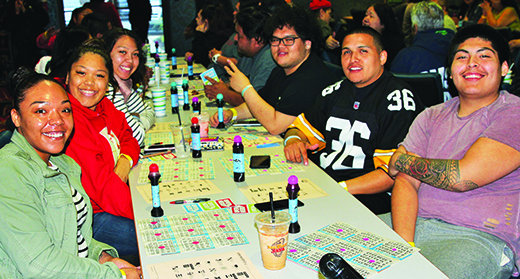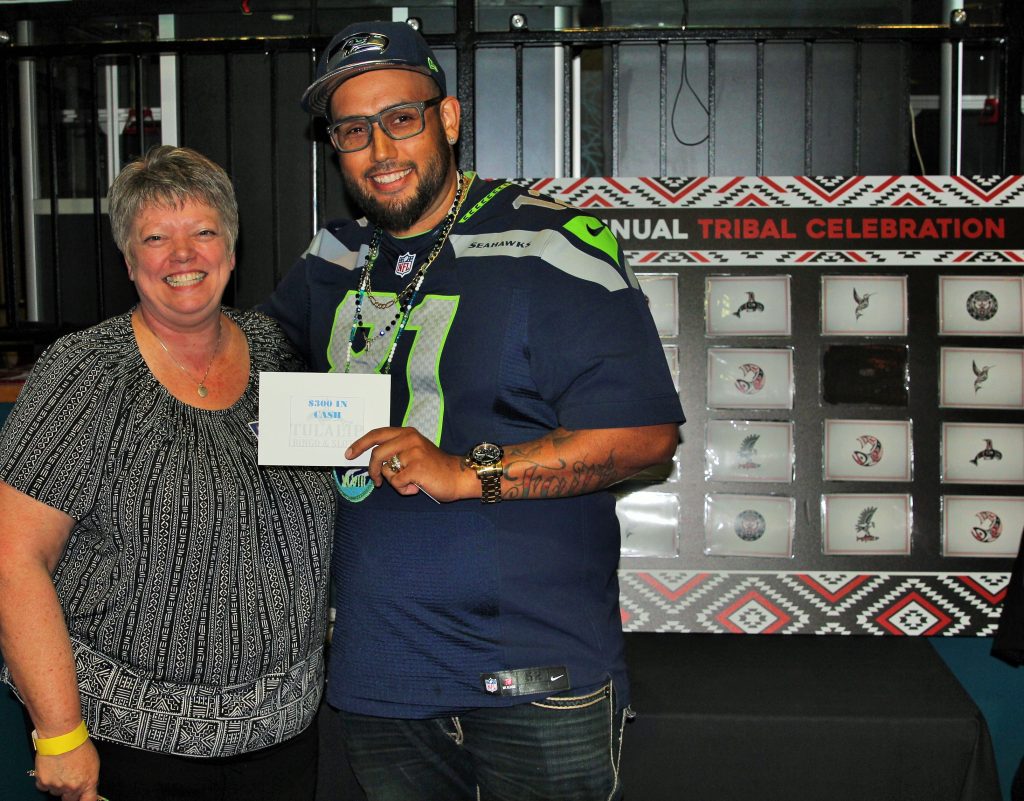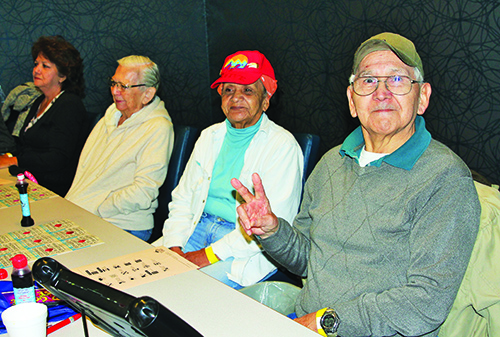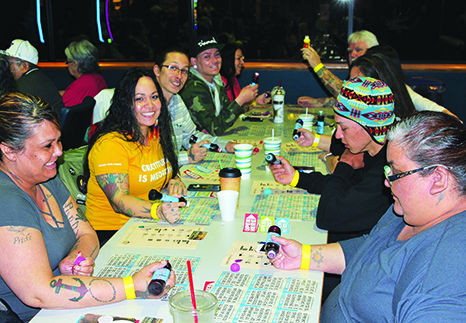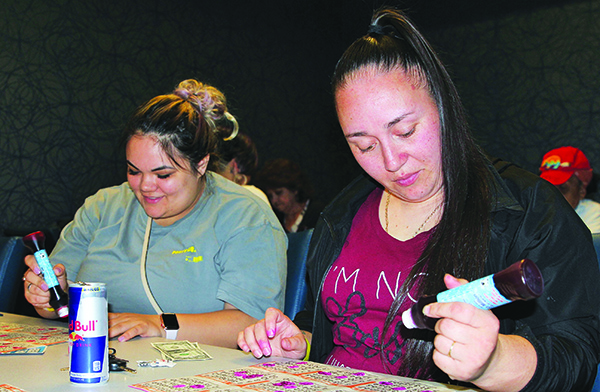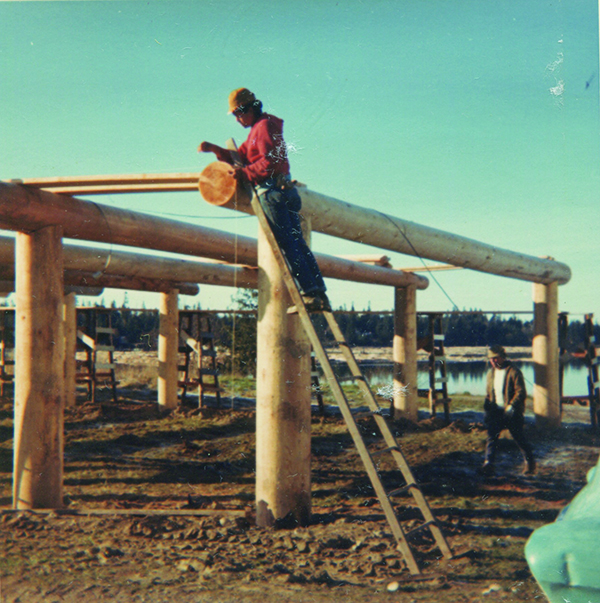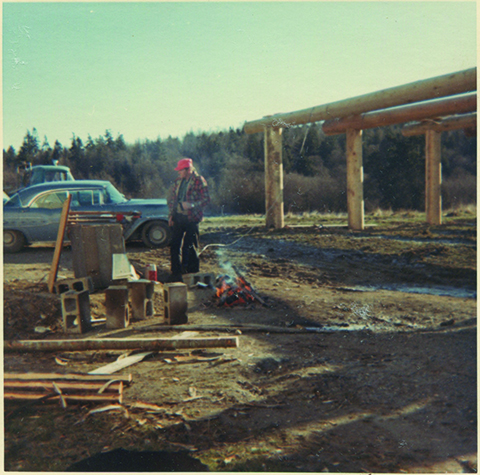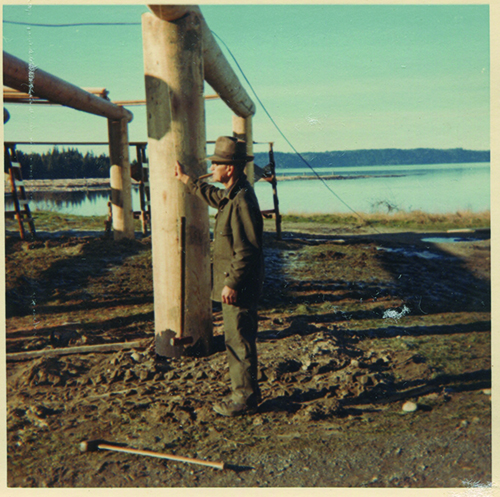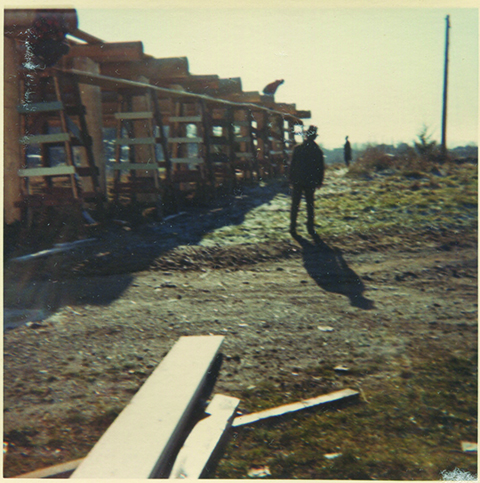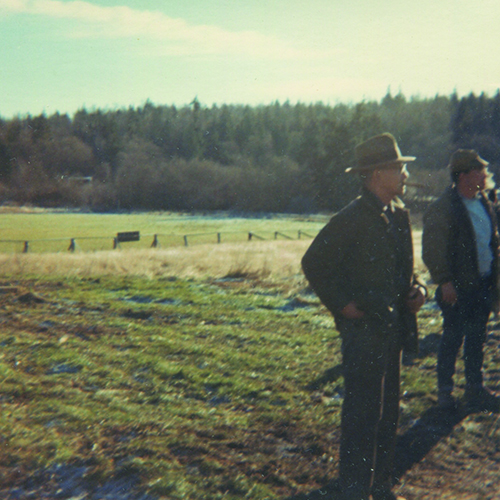Please use the following link to download the May 19, 2018 issue of the syəcəb: https://www.dropbox.com/s/6etacszj0f4vp2g/May%2019%202018%20sy%C9%99c%C9%99b.pdf?dl=0
Bonnie Jean Hynes
Bonnie Jean Hynes , 58, of Lynnwood, WA, peacefully passed away Wednesday, April 25, 2018, after a courageous fight with Acute Myeloid Leukemia. She is survived by her mother, Audrey Hynes, sisters: Johanna Van Scoy, Lora Seaward, Debbie Hynes and long-time companion of 30 years, Ralph McIntosh. Bonnie enjoyed all things Bingo, Bowling, Disney and Craft related. She made many friends participating in events at several Senior Centers around Snohomish County and on the Tulalip Reservation. Bonnie was a beading master and could whip up a bracelet for anyone in any theme after chatting with you for just a few minutes. Bonnie loved children and children loved Bonnie. Her nieces and nephew were a light in her life and she was especially thrilled to have recently become a Great Aunt. Bonnie always had a kind word and a smile for everyone she encountered and will be missed by all who knew her. For information regarding her memorial, please contact Johanna Van Scoy at 425-876-1617.
James Douglas “JD” Fryberg (1988 – 2018)
James Douglas “JD” Fryberg, 29, went peacefully in his sleep to be with our Lord on May 11, 2018, in Walla Walla, WA. JD was born December 7, 1988 in Everett, WA, to Gina Harrison and Dean Fryberg Jr. He was a loving, caring and adventurous soul. He grew up in Tulalip, Washington constantly surrounded by his family and friends. He had two children whom he loved and cherished very much, Tarynn Fryberg and Autumn Fryberg. He was so proud of his children. Throughout recent years, JD connected with his Native culture and became a grass dancer. He loved the Powwows he was able to participate in and danced with heart. JD also gained a passion for art that included drawing and beading. He was an amazing artist and made beautiful pieces for his family. No matter what JD was going through, he would make sure everyone else was doing ok. He constantly provided encouragement and support to family and friends to follow the right path and make a good life. JD always wanted everyone to know how much he loved them. He is survived by his children, Tarynn Fryberg and Autumn Fryberg; parents, Gina Harrison and Theseus Jones and Dean “Dizzy” Fryberg Jr. and Kathryn Cavendar; Siblings, Josh (Danielle) Fryberg, Ashley Harrison, Danika (Aurelia) Hatch-Aguilar, Deanne Fryberg, Rocky (Stephanie) Harrison, Tabatha Fagundes, Trevor (Cierra) Fryberg, David (June) Cavendar, Michael “Dub” Thompson; Grandpa Dean Fryberg Sr., Richard Madison; Great-grand-parents, Glen and Lee Parks; Special Aunt, Deedee Parks, Special Uncle, Alex Salinas and also numerous nieces, nephews, aunts, uncles cousins and all his special brothers. JD is preceded in death by his sister, Jennifer Fryberg; Grandmothers, Charmaine Harrison and Betty Henry; Grandfather, Frank Madison Sr.; Uncle, Hanford James Sr.; Aunties, MaryLou Williams and Lois “LouLou” Jones, Great-Granparents, Violet “Speedy Parks and Orville Harrison. JD will be missed by all and is now in Heaven rejoicing with his loved ones. Visitation will be May 17, 2018, from 1pm-2pm at the Schaefer-Shipman Funeral Home. Interfaith services will be May 17, 2018 at 6 p.m. at the Tulalip Tribal Gym. Funeral Services will be May 18, 2018 at 10 a.m. at the Tulalip Tribal Gym with burial to follow at the Mission Beach Cemetery.
Raising Awareness for Missing and Murdered Indigenous Women
By Micheal Rios, Tulalip News
“Missing and Murdered Indigenous Women (MMIW) are an epidemic in Washington State,” explained Earth-Feather Sovereign, a member of the Colville Confederated Tribes. “Washington State is 4th in the United States as having the most MMIW. I have two daughters, so I choose to not sit around and wait. Instead, I’m going to take action to try and make a better way for my children. There’s too many injustices going on with our Indigenous people. We should be the first thought, not the last thought.”
Earth-Feather coordinates the MMIW Washington group that aims to stop violence against Native women and children by advocating for social change in our communities. MMIW Washington recently worked with state legislatures to write a new state law that goes into effect in June.
House Bill 2951 is designed to open up the reporting and data-gathering on missing Native women. By requiring Washington State Patrol to work with tribal law enforcements and the Governor’s Office of Indian Affairs to conduct a study, House Bill 2951 will increase state resources that are greatly needed to combat an epidemic of MMIW.
The National Crime Information Database reported 5,712 known incidents of missing and murdered Indigenous women in 2016, while a recent report from the National Institute of Justice found that more than four out of five Native women have experienced violence in their lives. Additionally, the Centers for Disease Control and Prevention calls homicide the third-leading cause of death among Native women ages 10 to 24. And the U.S. Department of Justice has reported Native women living on reservations are ten times more likely to be murdered than those who live off the reservation.
Earth-Feather, along with many members of MMIW Washington, visited the Tulalip Reservation on May 8th as part of their eight-day march from Blaine, Washington to Olympia. The occasion allowed them to meet with community members and provided an open invitation to all to walk in prayer for their Native sisters who have been murdered and gone missing.
“Although a short notice, Tulalip Tribes made sure the group was honored with a meal and a place to sleep,” said Board of Director Marlin Fryberg, who greeted the MMIW Washington group as they arrived on the reservation. “Special thanks to Jen Maia for educating me on what MMIW is doing in North Dakota and helping me understand more about the cause and history. Awareness and education is key. Human trafficking has taken so many of our people across the nation and Canada. God bless everyone who has taken a stance.”
Following the prayer walk and a blessing, the MMIW of Washington made their way to the Dining Hall where a large gathering of community members waited to hear about their mission and journey. An estimated fifty-five people were in attendance, including representatives from the Board, Youth Council and police department. Many of the women attendees dressed in red to support the MMIW movement.
After everyone was treated to a catered dinner, they listened intently to the message, first-hand experience and call for action shared by their hosted guests.
“As a people we must uplift our women who are at the bottom of the so-called totem pole because when our life givers are able to heal and become strong, then all our nations start to heal,” expressed Earth-Feather during her heartfelt, key-note address. “We come from warrior people, we still are warriors. To our young men: you are protectors. Our women and children are sacred and need to be protected.”
Tribal member Deborah Parker shared her Woman Warrior Song, which comes from First Nations sisters in British Columbia, and gifted several speakers with custom-made MMIW flags. The evening concluded with the MMIW of Washington members offering song and prayer for those have gone missing, those have lost love ones to murder, and for any women seeking strength.
Come celebrate MSD25’s first annual Festival of World Cultures
MARYSVILLE, WA – The Marysville School District English Language Learners Program and Equity, Diversity and Indian Education Department invite families, students, staff and the community to an evening of cultural exploration and discovery through food, music, dance and art. The Festival of World Cultures, taking place on Friday, May 18 from 4:30 – 8 p.m. will feature booths and entertainment from the wealth of cultural backgrounds that form the local Marysville and Tulalip community.
At this Family Engagement event, guests will have an opportunity to sample food from different cultures and from around the world. Participants will also get to experience a variety of cultural dance and musical performances, learn words in Lushootseed, the language of several Salish Native American tribes of modern-day Washington state, and other languages spoken in the District including Spanish, Russian and Tagalog.
“The ELL Programs serves more than 1500 multilingual students and families in the District who speak more than 37 languages,” said Deborah Parker, The Marysville School District Director of Equity, Diversity and Indian Education. “Events like this help us celebrate the many contributions that make our community strong and united, and help us all understand the importance of respecting and honoring our diverse cultural backgrounds.”
Many community organizations and groups contributed to the event. If you are interested in sponsoring the event or hosting a booth, contact Erica Breien at erica_breien@msd25.org or visit the application form at www.bit.ly/WorldCulturesFest2018.
WHAT: Festival of World Cultures
WHEN: Friday, May 18, 2018, 4:30 – 8 p.m.
WHERE: Totem Middle School, 1605 7th St, Marysville, WA 98270
WHO: All students, families, staff and community members in the Marysville School District.
Ghosts of the Pacific: On the rise and wrapping up a video trilogy
By Kalvin Valdillez
Local up-and-coming rock band, Ghosts of the Pacific, is steadily increasing their number of fans and playing a handful of local shows. Officially forming in 2016, the band has been hard at work writing and recording their debut album while also performing live shows and shooting a music video trilogy. The band draws influence from a number of legendary rock groups and artists across several different genres, but upon hearing their music, you can tell that Ghost of the Pacific is definitely a Seattle rock band.
“I think we categorize ourselves as hard rock, but it’s a pretty wide range of stuff that we cover,” states guitarist, Sean Kebely. “We can get pretty heavy and then we’ll have a song that’s almost ballad-esque. We kind of cover all the spectrums but meld into one. We’re a diverse hard rock band.”
Sean, along with his father and Ghosts of the Pacific keyboardist David, originally started the band which was previously known as Ashes of Mercury.
“Shawn came to me and we started this project,” explains David. “He’s been in several bands before and this is my first project. It’s been amazing, I had to learn how to play with a band because before I was used to doing mostly solo stuff. We used to do a Christmas show every year at a Montessori school. He and I would perform Christmas rock and roll songs to open the show and we also did a few open mics doing The Doors covers. But this is my first time playing with a band.”
Ashes of Mercury went through several lineup changes before enlisting Josh Williams on vocals and Michael Ball on drums. By this time, Sean and Dave were ready for a new beginning and decided on a name change. They erased all the previous vocals from their songs and sent the tracks to Josh asking him to write his own original lyrics for the songs. Josh, who is the son of Tulalip tribal member Terry Williams, provides the band with gravelly and raspy vocals, reminiscent of early grunge bands.
“I’m from the Tulalip Indian reservation, I grew up there my whole life,” says Josh. “I’ve been in different projects and bands and Ghosts of the Pacific has been a solid act. These are cool guys, we hooked up about a year ago and have done a lot of work since then. I was raised heavy in the eighties music scene. I loved the nineties, got way into Alice in Chains, Soundgarden and Tool and even branched off when nu-metal came like Linkin Park and Papa Roach. I like to adapt to what’s going on in the music scene and dig into that. I don’t stay dated, I try not to. I think it’s harder now because of Spotify, it’s hard to follow any specific musical direction.”
“That’s why I was saying that we fall under hard rock,” concurs Sean. “That’s definitely the best genre that we fit. Because of the variety of influence we each have, you get a taste of everything. Right now we’re actually doing the album, I think we’re a little over halfway there of getting all the tracks down. It usually starts out as a guitar riff, Josh and I both play guitar so he’ll throw riffs my way and I’ll throw some riffs his way.”
“Over time, it morphs,” states David. “We all start putting our pieces in and it just kind of grows.”
Each member of Ghosts of the Pacific spoke passionately about music and their desire to inspire a new generation of musicians.
“I think music definitely benefits the youth, it did for me. When I picked up guitar at sixteen, I was in love with it,” Josh expresses. “With music you can explore and express, it gives you that outlet. Rappers and rockers will say that music is an outlet to take out their frustrations. You go to shows to release energy in the mosh pit or just to sit and watch a great band. Music is an outlet they can utilize when they feel like they have nowhere to go.”
“I started buying records at ten years old, they were singles, 45s,” shares David. “Especially in the wintertime, when I was living back east, we’d go in the basement of the school building, someone would bring a record player and the 45s and we would just dance. It was a way to interact and connect socially through the music. We’d discuss what we liked and what we didn’t like. And even in school, dances are always a big social event. After school, we always had the stereo going. Music has always been like a common language that we all can express and enjoy. I think it’s important as a means to communicate and meld socially.”
“Even if it’s not music, finding a hobby and something to focus your time and energy on is huge,” adds Sean. “I picked up guitar at thirteen. After school there’s a lot of free time to get into trouble but if you find something to focus on and expel most of your energy on you’ll have a brighter future and can do away with some of that negative stuff.”
Josh adds that having a great support system is a big help and credits the Tulalip Casino for allowing him to work on his music while working with them for nearly twenty years.
When asked for words of advisement for young musicians, Michael simply stated, “Anyone can play music and don’t ever think you can’t.”
“Come out and see us live,” states Sean. “We put a lot of time and effort into our live shows. We really try to make it a spectacle because that’s one of the reasons people go to shows, to feel the energy and emotion of the bands and I feel we really try to express that.”
For more information and to hear music by Ghosts of the Pacific please visit www.GhostsofthePacific.com. The band is currently planning to release the final music video of the trilogy this fall. In the meantime, please check out New Forgotten (part one) and Human Machine (part two) videos on the band’s YouTube page.
May 12, 2018 syəcəb
Please use the following link to download the May 12, 2018 issue of the syəcəb:
https://www.dropbox.com/s/2cciqyr17ujruuy/May%2012%202018%20sy%C9%99c%C9%99b.pdf?dl=0
Rose Margie Kempf-Harvey (1944 – 2018)
sta-gwa-letsa #1 Rose Margie Kempf-Harvey was born on June 4, 1944, in Darrington, WA, and passed away May 3, 2018, in Everett, WA. She was born to Jackson and Jessie Harvey and was the youngest of seven children. Rose helped the Sauk-Suiattle Tribe get federally recognized and was involved in initiating the ICW Act. She was a fisherwoman and was the first one to fish on the Sauk River. She loved the Seahawks, Mariners, picking berries, canning, and traveling to Hawaii. Rose also had her own Fry Bread stand, “Rosie’s Fry Bread and Indian Tacos.” Rose was also head cook for different spiritual ceremonies. She leaves behind her children, Lila Pierce, Donald Kempf Jr., Edward Kempf, Marvin Kempf, and Angie Thurbush, and several grandchildren and great-grandchildren. She also leaves behind several nieces and nephews. She is preceded in death by her husband, Donald Kempf Sr.; mother, Jessie T. Harvey, father, Jackson Harvey; brother, Paul Harvey; as well as Sally Moses, Violet Napoleon, Helen Pierce, Mary Jack, Jasper Harvey, Brandon Kempf, and Violet Pierce. Visitation will be Tuesday, May 8, 2018, at 1 p.m. at Schaefer-Shipman Funeral Home. Interfaith services will be at 6 p.m. that same evening at the Tulalip Gym. Funeral services will be May 9, 2018, at 10 a.m. at the Tulalip Gym with burial to follow at Mission Beach Cemetery.
It’s a B-I-N-G-O celebration!
By Micheal Rios, Tulalip News
Local Tulalip citizens were joined by their fellow tribal members that journeyed from as far north as Vancouver, B.C. and as far south as Tacoma to fill the seats of Tulalip Bingo on Monday, April 30. The occasion? The highly anticipated 17th annual Tribal Bingo Celebration. Hundreds and hundreds of tribal members joined in on the festivities and tried their luck to win high-end prizes and line their pockets with cold, hard cash.
Like he has done in years past, Board of Director Mel Sheldon reigned supreme on the mic as the MC for each of the 10:00a.m., 2:00p.m. and 6:00p.m. sessions. Mel kept the atmosphere lively and upbeat with plenty of jokes and witty banter.
“We are honored to host our tribal bingo while bringing fun and excitement to the membership for 17 wonderful years now,” said Tammy Taylor, Tulalip Bingo Director. “The beautiful part of our celebration is it really brings the tribal membership together for a fun time, free of politics and drama. Today really is all about our people enjoying each other’s company, sharing stories, and catching up with friends and family you don’t see often enough.”
Bingo staff did their best to make the 17th annual celebration one to remember. Like last year, the event split into three separate session instead of two. Keeping the extra third session made seating more comfortable and gave a slight bump to everyone’s chance of winning door prizes, giveaways and cash.
For Tulalip elder, 80-year-old Gilbert Moses, his streak of being the first entrant into Tribal Bingo is still secure. For the past seventeen years, Gilbert has shown up hours before doors open to the morning session in order to grab his favorite seat and give greetings to his cousins as they enter the event.
“Seeing family and friends I haven’t seen in a while is my favorite part,” shared Gilbert while watching his tablet-sized Bingo machine highlight one number after another. “It feels good to be here. The chance to win a prize is a plus, too.”
Spanning each session were 14 games of bingo. For each session there was an estimated $33,000 in total prizes awarded to bingo and door-prize raffle winners.
“Our Bingo team did a wonderful job of preparing for each session and executing as a team,” added Tammy. “There were virtually no lines, whether it was getting the membership in the door and finding a seat or getting a plate of food. Our Deli team cooked and prepared more than enough food for the breakfast, lunch and light dinner we provided. From our Bingo team members to the Enrollment team members, everyone did a fantastic job start to finish.”
Smiles and laughs were had by all as tribal members eagerly daubed away over the two-hour sessions. For those lucky enough, they had the opportunity to yell out an ecstatic, “BINGO!”
Thank you to all the people who lovingly honored the 1968 Longhouse builders
Submitted by Lena Jones, MaOM, Education Curator, Tulalip Tribes Hibulb Cultural Center
On April 21, 2018, the Tulalip Longhouse Committee held a gathering to honor the ones involved in the reconstruction of the Tulalip Longhouse fifty years ago. The longhouse is said to carry the oldest teachings in our land and is a symbol for the many traditions of Coast Salish people. The joyful spirit of the celebration reminded those in attendance of the values of the builders and the kindness and dedication that guided their work.
Construction of the longhouse began on November 22, 1967, and finished on January 17, 1968, in time for the Treaty Day Commemoration. An article in the Everett Herald in 1968 noted that the list of names of the builders were “men whose roots go deep, far back for generations of leadership among the Snohomish.”
The builders were Herman Williams, Sr., Arley Williams, Clyde Williams, Sr., Francis Sheldon, Ralph Jones, Sr., Tom Reeves, Myron Fryberg, Sr., and Leroy Fryberg, Sr. Lawrence Williams was the foreman. Ralph Jones, Bernie Gobin, and Ron Kona from the Board of Directors made the motions to build the longhouse, set funds aside, and secure the location; and Wayne Williams coordinated the construction work. Morris Dan, a Swinomish member and notable longhouse speaker during this period, was the consultant for the longhouse construction. Morris Dan is also remembered as a foremost collaborator in revitalizing the salmon ceremony at Tulalip.
Brothers Herman, Arley, and Clyde Williams, living members of the construction team, were recognized with a blanket and a message of appreciation for their legacy and their part in the great heritage the builders brought to Tulalip. Clyde Williams, Jr., accepted the gifts on their behalf, saying one of his childhood memories is his father working on the longhouse building and going to help them. Through the years, many have continued to take care of the longhouse.
Myron Fryberg, Jr., a witness to the Honoring Ceremony, thanked the Longhouse Committee and the Tulalip Tribes on behalf of the Williams, Hatch, and Fryberg families for remembering the builders and paying tribute to their work. It was an honor to be there to honor his father. He thanked all the families of the builders who attended on a beautiful sunshiny day, as well as the ones who performed the ceremony honoring the builders.
Susan Moses, also a witness, shared the story she heard from her father Kenny Moses about a tribe who had fallen on hard times and didn’t know what to do to take care of their people. One of their elders told them to build a longhouse. They listened, even though it must have been very difficult for them. All the village families were suffering in poverty, but little by little they worked on the building, and soon, more things were coming to their community.
When they finished, they invited their neighboring communities. People came in song and dance and prayer, and their families were provided for. It was told to Susan that this village became one of the wealthiest, and it was most likely because they built the home with good hearts and as prayers came, their situation improved. She said she believes that is how it was with the builders of the Tulalip longhouse. Their good hearts were a blessing to the Tulalip community.
Marilyn Sheldon reiterated that sentiment. She remembers her father Francis “Francy” Sheldon as a devoted and tireless worker for Tulalip, doing whatever he could in honor of Tulalip and the Tulalip people. He and her mother ensured their children valued the longhouse and the songs, prayers, and medicines of their ancestors. She believed all of the builders had that loving sentiment and care for the Tulalip community.
